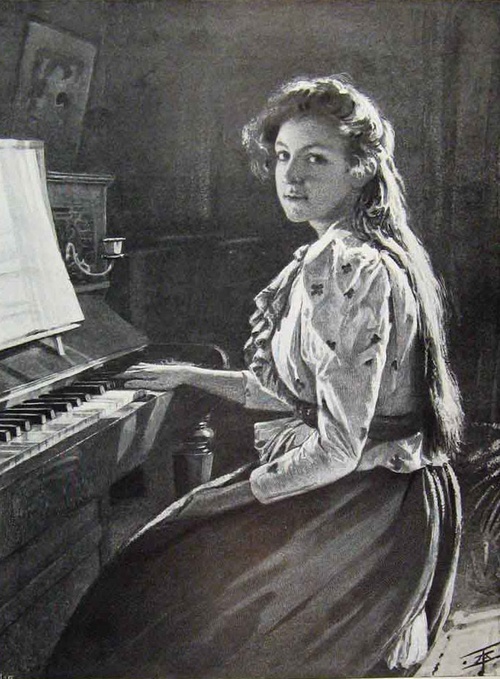
A Photo Examination
One of two second-place stories from the 2011 Quebec Writing Competition.
The first thing I did was scan the photograph. I wanted to blow up some corners, get a good peek inside that black-and-white world where you are sitting, lovely, some fifty years ago. The back of the photo, curled lengthwise, says in purple print stamped by the photo shop: Foto Miniæ. Maturška Banja. Vila Soko. It must have been one of those summers (you’re wearing a short-sleeved dress) when you performed with your parents in hotels, spas, and restaurants. I have a number of those photographs where the four of you (Uncle Bucko included) are at various instruments, switching with seeming effortlessness from the drums, to the piano, to the accordion, to the guitar. In this one, though, you’re alone at the piano, looking straight into the camera (was Uncle behind it? or a secret admirer?). In fact, this is probably the stage—the cheap-looking, leaf-patterned curtain that enters into the frame in the upper right corner would indicate so. And this is probably you rehearsing before a show? Or in the break between sets?
The first mild shock comes from noticing a cigarette pack (can’t make out the brand even with the maximum zoom; perhaps Drina?—but the pack seems too wide) and a box of matches on top of the piano. Yours? Of course I know you smoked—you told me you smoked even while you were pregnant—but my image of you is the contrary of the cigarette and the smoke. I was little when you quit; my memories of it have disappeared, and this is a different you I am seeing. There is, however, one thing on top of that piano which is very much you, the way I know you: at the far end, close to the wall, there is a thin (silk?) shawl, casually heaped on the piano. And immediately I think of your shawls of various colours but with the same perfume—the perfume that always meant “you”—which used to be stacked in the hallway wardrobe (I can still smell it—or I think I can—in the couple of them I keep at the bottom of one drawer; one has white polka dots on a blue background, and a frayed corner). The closer end of the piano is cluttered with a small mess: an open notebook (those don’t seem to be music charts; perhaps lyrics? new songs you were practicing?), something that looks like a crumpled banknote, a white handkerchief (?), some loose sheets. (How strange to see this minuscule chaos of objects next to you: you always said you could never think if your desk was untidy; but perhaps it was different with music and pianos...). All of it within reach of that right hand touching lightly the black keys in the lower left corner.
And then the hands. The right one fully engaged, the left one somewhat frivolous (aware of the “pose-for-the-photograph!” moment), pressing a white key with only one finger, the thumb and the pinky high in the air, as if having nothing to do with it. (I know the morphology of your hands, the commas and full-stops of your fingers, the phrases of your knuckles; I would recognize you by just looking at your hands, even here, when they didn’t have any spots yet—their constellations I also knew later.) The thin black strap of the wristwatch on your left hand matches perfectly the black line and button of your modestly cut dress and creates an intricate and closed off universe of blacks and whites together with the piano; the world you are clearly at ease with, even though it is completely different from the one we shared later, with no pianos and no time to play music except on special occasions. (The watch—or what could be imagined, based on the strap—seems similar to the one you gave me when I left home: to carry you with me on my hand, and to never forget that time passes. The watch that stopped the day before you were gone and that I superstitiously tried to have fixed as soon as possible, in vain.)
Then up the arms to your face. And another light shock, since it is obviously you, but also my brother, and also me. (The first second of looking at any of your old photographs always makes me breathe in with the tiny gasp of the uncanny.) But then the details draw my attention: is that a hint of eye-pencil around your eyes? For some strange reason, your left eyebrow seems a little bushier than the right one. Are those bangs on top of your forehead? (I saw you with long hair and short hair and gray hair, which you loved, but never with bangs!) But above all, there is the tautness and the glossiness of your new, young face, open to the world like a flower, not thinking of all kinds of weather ahead. Clear-eyed and delicate, like the small white pearls on the string around your neck, your only ornament. (Could they be the same ones Grandmother pulled out from a little drawer in her old Singer sewing machine and gave me the last time I saw her? If I lean back in my chair, I see them on the wall to my left where I hung them up, much yellowed now. Were they hers, or were they yours? Had she kept them to remember those days when you were all together?)
I look at all of you again: like Tolstoy’s Natasha before the grand ball, you are shining here through “the irrecoverable golden days of your girlhood.” And although you are looking at me, I am not really there, and I shouldn’t be. So I zoom you back to scale and leave you, lovely and radiant, in this world of eternal youth, eternal beauty, that once belonged to you fully.
See the rest of Issue 42 (Winter 2011).
Subscribe to Maisonneuve today.
Related on maisonneuve.org:





